Mark Mattock shares his May stint at the cabin with beetles and butterflies, paradox and irony, life and death.
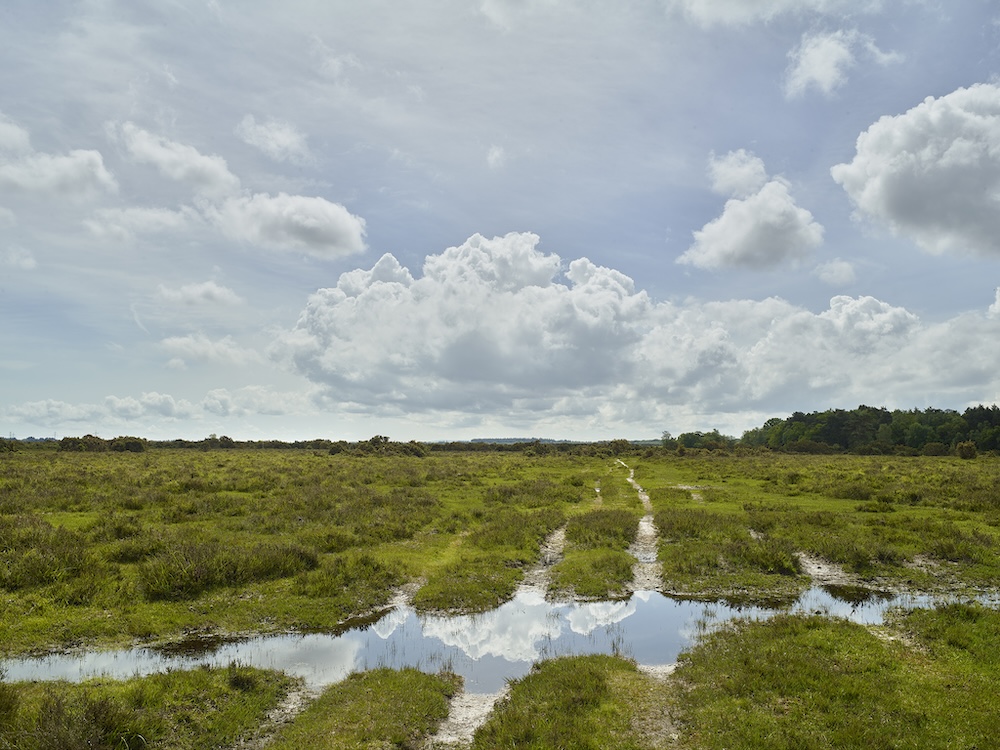
‘”Well,” he thought, I suppose I’m lucky to be alive at all”‘ — Fantastic Mr. Fox
For a split second, out of the train window as it smoothly clatters down through South London, in the ‘glyphosated’ sidings at the bottom of an immense bank of budding bramble, lost in plain sight among the crippled, poison-coloured vegetation thinly bristling from the rail track ballast, flashes a brief scene of unashamed vulpine sex. I smile at the fantastic urban couple. Dog and vixen. But wait, mating season is January!
A tawdry turd nestles ostentatiously, glistening in a tussock of cocksfoot at the side of the forest path. At first I thought it was something lost, a piece of ornamented fashion accessory. The jet-black fox scat, scented marker; bejewelled with an encrusted mosaic of metallic dor beetle cuticle: sharp-cornered wing casings, tuff thoraxes, tiny thick-thighed spiky legs. Jumbled black patent beetle kits shining deep blues: cobalt to indigo to ultramarine; greens, purples. Imagine how uncomfortable it must get shitting something like that regularly. More is scattered all along the half mile of track. And the twisted irony…dor beetles are dung beetles.
Heavy breezing in the canopy. Flexing branches exposing the paler undersides of manically gyrating leaves, spraying an extra texture over the forest landscape. From somewhere in the irritating hiss and whirling discord, two faint familiar notes, intermittent, spasmodic, possibly just within the realm of my hearing. So faint I’m not sure if they’re real or if my imagination is hearing some Puck blowing his flute somewhere in the greenwood beyond. Then again, barely audible in the din, a distant ‘cuc’; another, then seconds later a far away ‘koo’. The notes lost in the winds like dancing feathers, plucked by a preening bird. I cup my hands to my ears to try to confirm and reconnect them. Like a radar dish searching for signs of life beyond everything known, and unknown. Remembering some flowers are ears, shaped by evolution to listen for bees, or to condense and return bat echolocation signals.
In stark contrast ground level is blissfully warm, bright; calm and cozy. Fresh pearl bordered fritillaries flit and glide from blue bugle to yellow tormentil flowers. Thrilled, haven’t seen one for decades. A butterfly that has suffered catastrophic decline due to neglected — un-coppiced — woods and, paradoxically, tree regeneration. Twenty minutes further on and what looks like the miniscule crash helmet worn by an invisible elf in an invisible microlight approaches. I pluck it out of the air with ease as it passes, almost in slow motion, then feel the sharp double-talon-tipped feet of the rose chafer as it tries to lever, with considerable force, my two middle fingers apart with its head. Gasp as I open my hand to reveal the brilliantly burnished green scarab jewel.
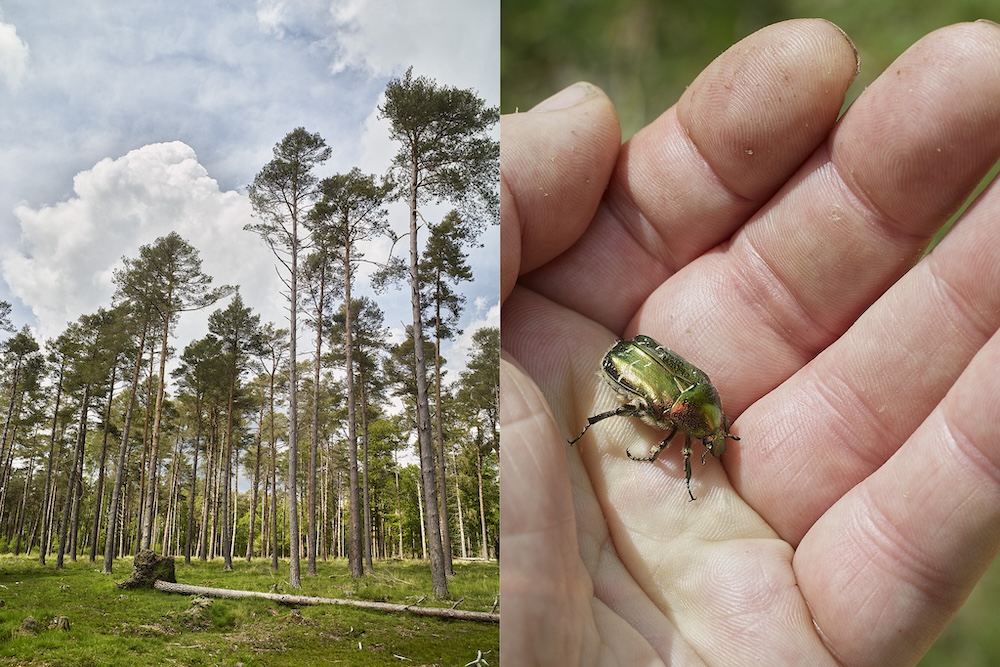
I nearly soil myself just an hour later. I’m briefly squat, spine pressed painfully against the massive coal sack of an oak bole, camouflaging in its ancient dank aura. I’m waiting, with binoculars locked on a gargoyle face in an adjacent green epiphite-cloaked giant, to see if I’ve found a redstart’s nest site — when suddenly, in an instant, the sylvan peace is obliterated, literally as if something has exploded out of the tree I’m pressed against. I leap up and away from a flash of day-glo pink, loudly releasing a barrage of involuntary expletives, at the same time hearing an echo of the same obscenities. From the cross country runner who has just as good as leapt like a gazelle over me to avoid collision. We’re both shocked by each other’s sudden presence, and language! My heart’s hammering and the instant adrenaline winds me up like a circling clockwork toy. We repeat ‘sorry, sorry,’ to each other over and over whilst giggling with relief, and at the absurdity, as she bounds away along the snaking aisle of the vast forest duomo. The lurid pink kinesio tape strapping on her powerful sun-stained legs glows as she passes through the pools of green sunlight, beamed from chlorophyll-stained windows as loud as she was silent. The only other time I’ve been overwhelmingly startled like that was when I almost leapt into the river because of a fox that had crept up and yapped, blood-curdlingly, right behind me whilst fishing one silent pitch-dark night. I shook for ten minutes after; my cussing must have been audible half a mile away.
As I near the cabin I see the tide is in. The long line of shine beyond broken by the giant baluster of trees. It took longer than usual, I had to detour several times, the land still waterlogged; swollen brooks and knee-deep swamps. My mint tea supply that I left in glass on the kitchen windowsill two weeks ago has flourished. Plants standing pert, new leaves, a tangle of white roots worm through the aquatic detritus. It looks like a paludarium (terrarium with water) and a microcosm of what I’ve just walked across.
I’m convinced it’s dimmer under the cabin oaks than it was this time last year. Every vibrant deep green lobed leaf looks bigger. The ‘greendom’ is bluer. Darker leaves and blades. Faded the yellow and red of fresh growth. Full on chlorophyl flood. Dark enough that even under cloud cover the apertures in the canopy cast a clearly defined shadow of me faintly on the limp leaf litter, still damp as I constantly criss-cross marshside to riverside. Sound falls as leaves from the canopy. The relentless begging from tribes of tit fledglings — blue, great and long tailed — gang mobbing burned out parents. Each with its own incessant high pitch patois, as they flit through the leaves too high and quick to spot.
A herring gull is struggling to find purchase on a heavy fish it’s trying to pull across the purslane beds, its beak repeatedly slipping on the tightly tiled, plastic-like scales of the solid mullet. Every few inches it stops to viciously fend off two of its kin. Finally it gets a good enough grip to lift and jerk the mullet’s head into its suddenly enormous gape. It raises its head to get assistance from gravity. The blundering bird now top-heavy; dodging, body swerving the lunges of the pursuers. Head stuck skyward with a stiff weightlifter neck, trying to not tip forward, the fish tail protruding like a grotesquely bloated tongue. Fifteen minutes before the gagging, flapping bird finally closes its yellow mandibles, murmurs two notes of contentment, almost too heavy to take off. Below me in the water, movement; a small patch of river bed morphs into a flounder and skims away.

The last bass to leave the marsh slips under the footbridge with urgency, bloated with crabs, pushing a huge bow wave in front of it. It’s always the largest that risk leaving it to the last minute. Experience. Confined to the snaking rivulet at the bottom of the inlet, she passes a Canada goose who steps back unnerved, then a pair of mallards, browsing, heads submerged. Fish eye and bird eye briefly meet across two feet of water. What must each look like to the other? Moments later all that is left are the ripples sparkling over the sifted gravel at the very bottom of the fissure, up which yellow foot (the egret) now steps, pulling ragworm after ragworm from the mud. His long trailing head plumes flailing in the estuarine wind like a destroyed comb-over.
Tall ascending choirs of foxgloves, magenta mouths, singing suggestive promises to bees, packed tight and in perfect unison, crowd the paths. Some flower spikes fallen under the weight of florets like wind-blown pines. A silhouetted tree pipit gently control crashes out of the sky like a piece of paper ember from some distant fire, black and crisp, smouldering with descending song. A cuckoo, poised slack-winged like a pointy angular hawk, stirring the air with his long tail, at the very top of an old bleached skeletal ‘polypored’ birch with one living limb, surveys his heathland estate like some warden; pipit manager. Female cuckoos now known to totally manipulate the egg-laying of their flock of hosts.
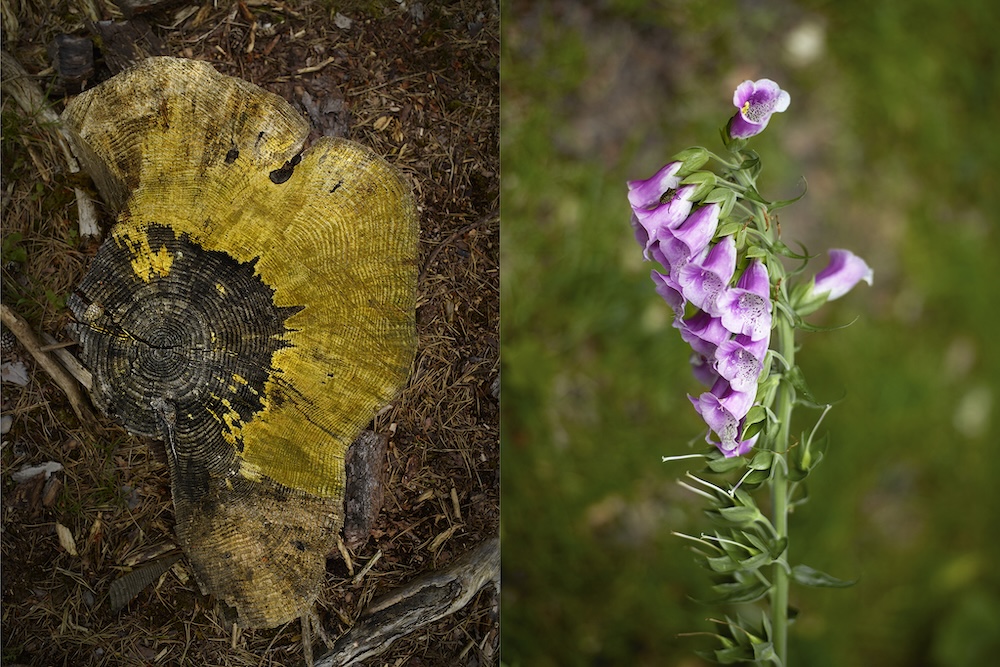
It rains all morning. I fill moleskine pages with drawings of Golgotha the oak. Her sodden dress, sliding off under the weight, a deep burgundy, intricately embroidered with the grey-green of lichen, as she shakes the wet from her shawl of deep green. The dishwashers (pied wagtails) definitely have a nest somewhere in the slowly dismantling jetty. Continuously lifting and landing on and off the wooden slatted platform, dashing to the edge in toe-splayed steps as if wearing tiny snow shoes, small insect at the tip of their beaks. I nearly fall off into the water as I lay and lean right over, searching for the nest after the rain stops. I can’t find it. Parents calling in a panic on the mud mounds. When I get up I notice dry grass in a gap between the end slats. Lift one up, immediately, from the dark corner in the framework, bursts a crown of weird bright orange florets, the trembling flowers of some little flesh-eating plant. The gapes of the chicks like lighter flames on some statically charged, and charred, wiry fluff-headed urchins with black bruised bulges where eyes should be. Grotesquely cute. No morning coffee on the jetty for a while.
A mallard drake sits, slumped heavily, on the ground among the bramble domes. He watches me slowly approach without any attempt to flee. Head erect and alert, no sign of injury, his impeccable plumage unruffled, the kiss curl feathers on his tail immaculate. Clearly he is hurt. Only when I kneel next to him does he try, hopelessly, briefly, to flee, but can’t at all. He’s hurt bad. He’s not the escaped victim of hawk or falcon. We’re a hundred meters from the single track road, and the small pond I know he’s from. He’s been present with his partner every time I passed in the last few weeks. He’s been hit hard by a car. But he’s not concussed, or confused, his head tells me. In his perfectly round little onyx eye, with the whole sky above us condensed into a pin prick of intense light sparkling from its rim, he stares at me, from an opulent balaclava of the darkest velvet, sheening regal greens, blues, and the black just before the beginning of the universe. I could have been fox, or stoat, or buzzard; doing the right thing would be to do as they would. Naturally. Not to leave him to be barked at or mauled by some walker’s dog that doesn’t know why or how anymore. Clumsily ‘put him out of his misery’ with well-intentioned kindness, and dump him in the brambles, remorseful, anguished and inadequate. I know that he is an unexpected gift and I the fortunate recipient. A gift from the land as much as any cep or samphire. It’s not hunting, I haven’t shot him, not my thing, but it is eye to eye. It’s time. One swift sharp thwack to his neck, below his pure white neck collar, with a hazel cane. I am so sorry, I feel shit, but also so grateful. Surprised how heavy he is as I slip him into a tote bag. Within a minute of being slung over my shoulder the bag suddenly shakes violently as muscle recalls its last memory, before rigor mortis, as if he can now do what he desperately needed to do at the sight of me approaching…fly away. All meat-eaters should know this feeling.
A flittery bat orbits Golgotha’s gently twisting midriff repeatedly as if they’re dancing. Her diminutive partner. One that by day she keeps inside somewhere.
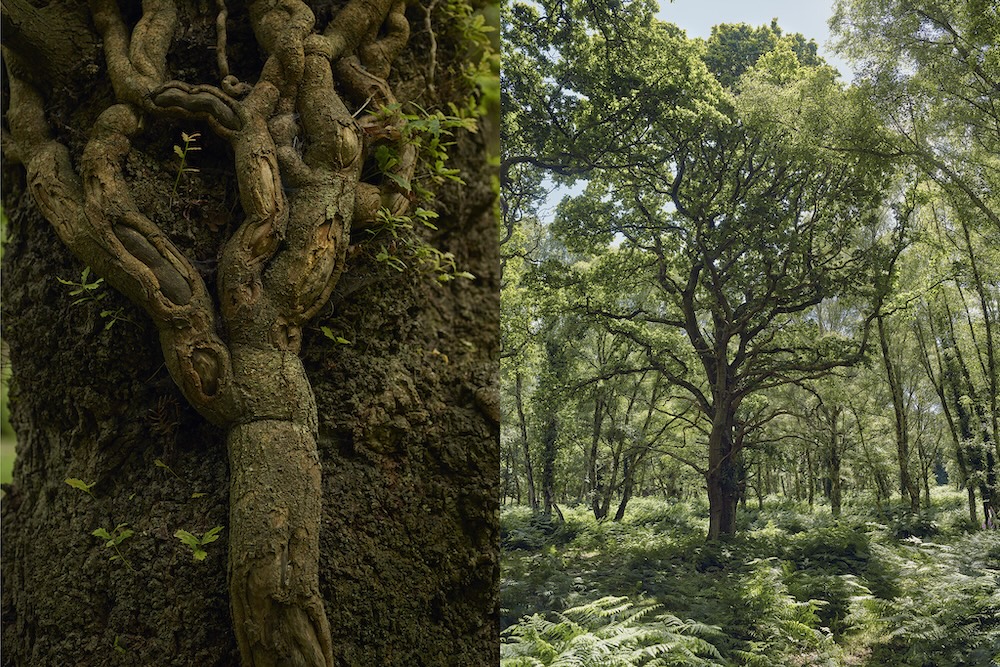
The sun peers from around the end of the oaks that stretch from the cabin and catches the spinning wheels of bass fry sizzling in the sneaking-up shallows, individuals leaping like spits of hot oil. Its reflection bounces off the rippling water and lights the underside of the heavy boughs which now pulse like burning beams. By midday its heat has liquified the air over the marsh. In the wobbling vapour a pair of crows shimmer purple as they methodically turn over dry mats of gutweed that look like old cow pats and flattened road kill. Sprinkles of white cloud cross the blue eternity like puffs of spilt flour.
I feel for his sternum in the dense soft of the drake’s delicate, intricately barred breast feathers. Part them with thumb and forefinger. Cut an opening slit into the skin right on the bone edge. Plucking feathers has the same vibe as finger nails on a blackboard. I will have to forgo crispy delicious skin. In the peeled opened breast the meat sits like a warm heart. Glistening deep dark claret red. I slice away the two lobes. It’s all I need. Like the goshawk or the peregrine, I know, it’s the best stuff. I’m trying to butcher with respect, it’s important, the beginning of the reciprocity: reverence, acknowledgment, appreciation, understanding; grasping the whole picture. I didn’t buy the duck. I didn’t order him from a menu. He’s not naked, wrapped in plastic, headless and heartless. He was a gift and I’m obliged to reciprocate. Done, I bundle him up and take him to margin of the bay and tuck him under some overhanging purslane in anticipation of a later nature spectacle. Celebrity chef says it’s about honouring the produce; it’s more, it’s the land, the environment, the planet. Symbiosis. Pan fried breast of wild duck with diced chicken of the woods, unbelievably gifted moments after finding the mallard from the nearby tree I collect it from every season. From the distance the bright orange yellow lobes of burning bright fungal larva oozing from the bole screaming ‘you need this now.’ And new samphire from out on the marsh. The land keeps gifting. Take only that which is given.
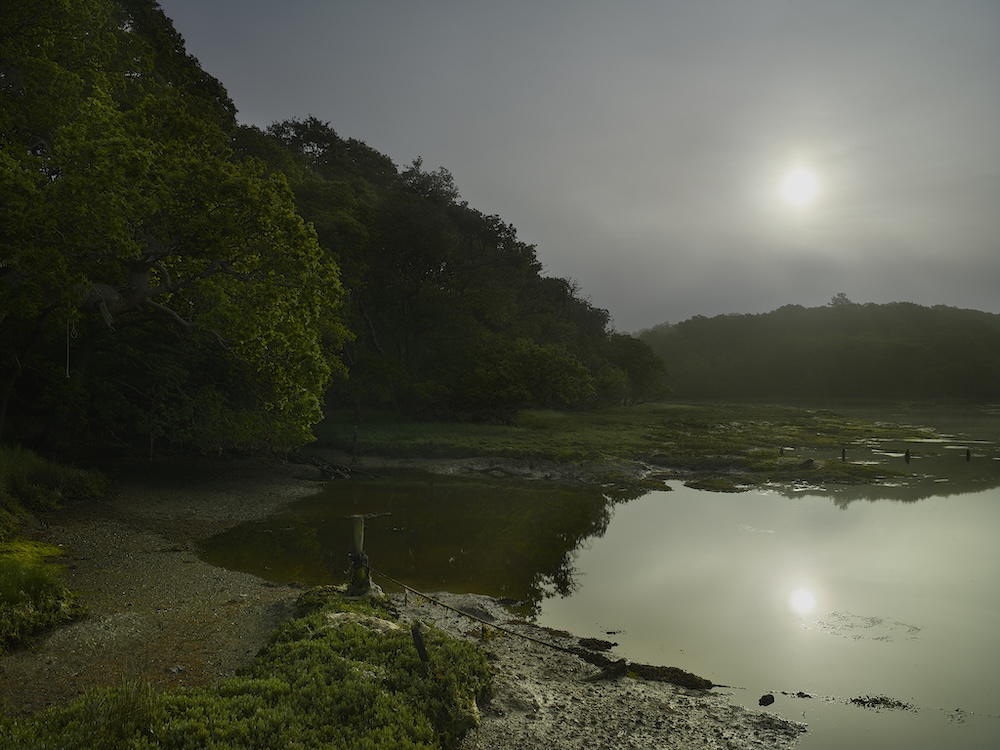
The dexterity of their mechanical claws is incredible. Two days later the crabs have hauled out the mallard and are now feasting and fighting on the macerated corpse, in the mud and water, in the full glare of the late morning sun. Through the viewfinder an absolute epic vision: horror, beauty; revulsion, awe. So visceral, so mechanical. They respectfully dismantle the corpse with the skill of surgeons, whilst fighting ugly for space like sumo wrestlers. Crustaceous arms spread in hooligan taunts and baiting. A claw probes deep into the empty eye socket to pick tidbits. Another crab peels back the soggy neck skin and holds it with one claw whilst nipping bits of flesh from the exposed neck vertebrae with the other. More pulling and probing under the yellow mandibles cause the beak to move as if the duck is gasping for air. The grating of their exoskeletons against each other, the clacking of jointed appendages. All like some sumptuous, monumental, Renaissance depiction of nature. Can’t help seeing Artermisia Gentileschi’s and Caravaggio’s slaying, beheading, of Holofernes. Get up finally, dizzy after laying and staring through the viewfinder, shielded from the glare. High above, circling, the white tailed eagle.
The redstart’s nest site is in a harvest hole in the gnarliest of dead oaks in the grove. I find it on my way out of the forest. Squatting once again, this time under a huge fallen bough, I spend thirty minutes watching male and female delivering beaks full of insects just above me. The male, in particular, poses at the rim before entering. The whole scene as if staged, each component part a perfect cliché: brilliant bird, gurning, cankerous oak wound, harmonious colour palette; reminding me of the incredibly beautiful 1950’s dye transfer prints of ‘Vanishing Songbirds’ by American pioneer colour photographer Eliot Porter whose work, long ago, for the first time made clear to me the possibility that a photograph of something can be an image, an art work, first.
*
Mark Mattock. Artist. Photographer. Publisher. Rabbit Fighter. @the_rabbit_fighters_club